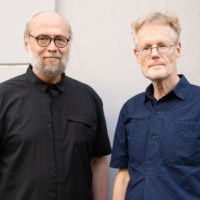The perception of a ‹World Soul› – an essence that molds and directs the physical universe into a harmonious organism – has shaped important moments in European intellectual history. In this article, on the basis of Plato and Plotinus – central figures of ancient philosophy and spirituality – some aspects of this perception shall be characterized, which can make the time-honored term ‹World Soul› inspiring for the present time.1 Particular emphasis is placed on those that point to the possibility of human beings’ creative participation in the life of the World Soul. Indeed, it is precisely these aspects that can still today spur us to overcome that separation between I and world/nature that has so many problematic effects on our encounter with earth.
The Universe as Spirit, Soul, and Body
Like human beings, the universe is perceived as tripartite in spirit, soul and body in the main movements of ancient philosophy. This is shown in Plato’s ‹Timaeus›, the oldest detailed writing on the birth and formation of the universe preserved in the European area: the divine craftsman (Demiurge), who creates the universe, gives his creature a spirit (noûs). A visible being that reveals spiritual intelligence itself is more beautiful than a being that exists without its own intelligence. However, since it is impossible for a visible being to have a spirit without a soul, God designs the universe in such a way that it is constituted by a spirit in a soul as well as by a soul in a visible/physical body, as a tripartite unity (‹Timaeus› 30 b). In turn, the spirit connects the universe with the highest spiritual being – which is at the same time perceived by Plato as the wholeness of the spiritual world – according to whose image the universe is created (ibid. 30 c-31a)2, while the soul, through its intrinsic, intimate relationship with the spirit, imparts to the universe the forces that coherently nourish its visible life. Thus, the universe is an autonomous, self-nourishing (ibid. 33 c-d), self-determined being, conscious of itself through its own spirit, ‹friendly› with itself, and therefore divine (ibid., 34 b). Its bodily form is in turn spherical – a perfect form encompassing all other forms (ibid. 32 b). The Demiurge places its soul in the middle of this sphere, stretching it out through the whole universe while also enveloping the world body from the outside (ibid. 34 b). Consequently, the universe, as a divine living being conscious of itself, forms a unity of body, soul, and spirit, in which body and soul allow the spirit to reveal itself harmoniously as visible, spatiotemporal forms. Here, the impact of the spirit does not suppress the specificity of soul and body, but fruitfully emphasizes it.
World and Human Soul as Musical Entity
So that the World Soul can direct and form the life of the cosmos coherently, the divine craftsman has formed it according to arithmetic-geometrical-musical relations (ibid. 34b-36 d).3 Thanks to these, the three basic properties of the soul – identity, sameness, and difference (ibid. 35 a-b) – can sound together as the structure of a harmonious individual being. This mathematical-musical constitution of the World Soul is also revealed in human beings’ souls, which are constituted by the Demiurge on the basis of almost the same relations as the World Soul, but originating from a not equally pure basis (ibid. 41 d). In this, the Demiurge directly conveys to them only their divine nature, their spirit (ibid. 41 c, 69 d, 90 a), while their mortal nature is fashioned by ‹lower› deities (ibid. 41 d, 69 c-d). Through their spirit, human souls are able to consciously shape their own lives according to harmonious rhythms of the universe, which means according to harmonious movements of the World Soul, which is the most harmonious form of life for them (ibid. 90 c-d).
World Soul as Collectivist Self?
Can Plato’s or any similar notion of the World Soul be related to the notion of a collectivist global self? In other words, can the World Soul as characterized by Plato – as well as by later thinkers, not only ancient ones – resonate, for example, with the notion of ‹global consciousness› as presupposed in the ‹Global Consciousness Project› begun in 1998 and led by Roger Nelson at Princeton University?4

According to the results of the above-mentioned project, an event that strongly influences a sufficiently large number of people psychologically/emotionally can ‹synchronize›, bring into a mutual agreement, the emotions of those people in such a way that the effect of this synchronization can be demonstrated physically with the help of suitable measuring instruments. This would point to the emergence, the arising, of a noosphere (‹sphere of reason›)5 or a global field of consciousness, which would confirm corresponding representations of a global consciousness in various spiritual movements. However, the phenomena indicated here indeed point to a ‹psychological› form of consciousness, to a collective, psychological self, which emerges originating from external impulses and stimulations and is accordingly determined by them. Though this contradicts the form of consciousness inherent in the World Soul characterized by Plato and other philosophers. For the latter is spiritual, not psychological, and as such is incompatible with both the notion of an emergent collective group self and determinability by external impulses or psychological/emotional dynamics. To explain this, I will take Plotinus’ work into account,6 which points exemplarily to an experience of the spirit, the World Souls as well as the true human self, which stands in creative continuity with Plato’s experience.
Spirit and World Soul
Plotinus wrote the oldest preserved treatise on freedom, ‹Enneads› VI 8. Therein a strict distinction is made between the soul and the spirit with regard to the possibility of real freedom: the spirit is freedom – complete self-determination – because it can, beyond all influencing pains and pleasures, antipathies and sympathies, unconditionally and creatively reveal the forces that generate all forms of being. In contrast, the soul can only be conditionally/limitedly free, because its life is constantly influenced by the mentioned factors (‹Enneads› VI 8.1-7). If the World Soul – according to Plotinus as well as according to Plato – is the basis for independence of the universe even in corporeality, this means that it directs and forms the universe on the basis of a spiritual, rather than psychological form of consciousness, receiving inexhaustible generative forces from the spirit and at the same time giving them to the corporeal aspect (‹Enneads› iv 7.24 ff.). However, their intimate, conscious relationship with the spirit does not imply an absorption of their individuality. For the spirit is eternal, instantaneous unity of identity and difference (‹Enneads› vi 7.13.22-23), so that spiritual reality is always different (ibid. 13.47) and can reveal itself in all directions of difference (ibid. 13.25). This means that the spirit is eternally new, which lives as unrestricted openness to the other, not as absorption of the other, and therefore acts as inexhaustible generativity/productivity (‹Enneads› v 8.4.46-47). Consequently, a conscious relationship to the spirit does not imply reproduction of already existing forms of the spiritual, but can only be understood as eminently free, creative activity, from which a new form of being is born. This also means that the spirit is not a collectivistic self but an inexhaustibly diverse unity of centers of consciousness: a living sphere (‹Enneads› ii 9.17.5-15, V 8.9.8-28, vi 5.10.44, VI 7.15.25-26) in which each aspect consciously reveals all the other aspects, the center, and the wholeness of the sphere through conscious self-revelation (see ‹Enneas› v 8.4.4-11). Thereby, each aspect is to be considered as a uniquely individualized, fully self-aware, creative self, that is, as a ‹face›. (‹Enneads› VI 7.15.27). In turn, the World Soul is in its essence a living image of this spiritual sphere – of which by the way also the body of the universe with its spherical form is an image. Thus, their unity is not a collectivistic one but comprises a multiplicity of individual, independent souls, different but not separated from each other, that is, not determined by boundaries so that they could be alienated from each other (‹Enneas› VI 4.4.34 ff.). Among these souls, which, like the whole World Soul, can reveal their nature through a conscious relationship with the spirit, are also the souls of human beings.
Human Self and World Soul
Plato explicitly indicated that the human soul, if it reveals its nature coherently, can consciously participate in directing the universe and thus in the life of the World Soul (‹Phaidrus› 246 c). This possibility is emphasized by Plotinus several times: the individual soul directs the universe when it is consciously connected with the World Soul (‹Enneads› IV 4.4.34 ff, 7.13.9 ff, 8.2.19-27 and 4.1-10). This, however, does not imply a passive ‹being swept along› into some collective self. Genuine connection with the life of the World Soul can occur only when human beings become conscious of the spirit within themselves, discovering it and letting it unfold as their own true self or as the true human being (‹Enneads› i 2.6.1-12, VI 4.14, VI 5.7, VI 7.2 and 4-6). When this goal is achieved, human beings actively participate in the creation and direction of the universe (‹Enneads› v 8.7.31-36): as a creative self, originating from the manifold unity of the spiritual world, to which human beings truly belong.
I Am the World Soul!
According to Plotinus, experiencing the spirit through the soul does not mean silencing, but the strengthening of individual conscious awareness. It is based on conscious awareness, which, originating from itself, can reach higher and higher dimensions of creative awareness. Any level of silencing awareness, on the contrary, means creating distance from experiencing the spiritual. This silencing, however, explains the phenomena of collective consciousness that the ‹Global Consciousness Project› is investigating. Namely, while a relationship to the spiritual for Plotinus always implies that the awake and active self as well as its conscious awareness determines and shapes the human being’s form of being and consciousness, the human self and consciousness in the aforementioned phenomena are determined by an external being that is not permeated by consciousness and therefore generates only psychological phenomena. Consequently, the global consciousness that is generated by this does not mean growth beyond the everyday self, but a decrease in its possibilities. Namely into a state, which, purely caused by – indifferently if valued as negative or positive – external stimuli, seems to be oriented rather in the direction of mass psychosis. Global consciousness of the World Soul is, on Plotinus’ horizon, the exact opposite of this. For instead of drowning the conscious self in an emotional sea, the World Soul forms a community of consciously creative inter-sounding symphonic centers of consciousness. The World Soul is consequently the living sphere of a spiritual and thus free I-community in which each I-aspect, by its own conscious activity drawing from the creative power of the spiritual world, can co-create soul and body of the universe and thus of the earth as a harmonious wholeness. In other words: I am the World Soul! This is of course not meant in the sense of an atomistic, shrivelled, purely psychically and somatically determined I, but of an I which can experience itself more and more as a center/sphere of spiritual warmth and spiritual light. I am here, in all perceptions, sensations, feelings, thoughts, and actions a ‹world conversation›, whose world words can never be produced by external stimuli and controls, but can only be born out of creative consciousness, freedom and love. The claim to generate world consciousness, an ecological action by external, centralistic/collectivistic controlling factors, on the other hand, would not lead human beings to harmony with ancient spirituality but would degrade them to a mass, which would be self-less in the most negative sense, because human beings would no longer be capable of real free will. Such a slavish mass would not form a World Soul, but would only supply poor material for the action of forces which the dehumanized I would never consciously perceive.
Translation: Simone Stadlbacher
Footnotes
- For a concentrated account on the topic ‹World Soul› in Plato’s work see M. Erler, Plato. Basel 2007, p. 386-388; for further elaboration see M. von Perger, Die Allseele in Platons Timaios. Berlin 1997. On Plotinus see H. Ziebritzki, Holy Spirit and World Soul. The Problem With the Third Hypostasis in Regard to Origen, Plotinus and Their Predecessors. Tübingen 1994; M. Loder, The Existence of the Speculative. Investigations Into the Neoplatonic Theory of the Soul and Hegel’s Philosophy on the Subjective Spirit. Berlin 2016. On the concept of ‹World Soul› throughout ancient Greece, see the contributions in Chr. Helmig (Ed.), World Soul – Anima Mundi. On the Origins and Fortunes of a Fundamental Idea. Berlin 2020.
- This being is, according to the inner logic of Timaeus, Demiurge himself, who wanted to make the universe similar to himself (ibid. 29 e).
- For an introductory explanation of this extraordinarily complex passage, see F. M. Cornford, Plato’s Cosmology. London 1937, p. 59–65.
-
On this project, see https://noosphere.princeton.edu/ (with various case studies in the ‹New Reports› column) and R. D. Nelson, Connected: The Emergence of Global Consciousness. Princeton 2019 (German translation: Der Welt-Geist. Wie wir alle miteinander verbunden sind. Vienna 2019).
- On this term and its early developers (Wernadski, Le Roy, Teilhard de Chardin), see https://de.wikipedia.org/wiki/Noosph%C3%A4re (with good further bibliography).
- For an in-depth explanation of the Plotinian themes suggested below, see S. Lavecchia, Free From Self and From Other. On the Origin and Nature of the Noetic Self in Plotinus’ Philosophy. Perspectives of Philosophy 46 (2020), p. 20–30.














I endorse all that Yvette Oxlee has said plus the fact that I am a very Senior Citizen 92, and have been a Society member (Dornach) since about 1957 and am a State Pensioner plus, plus.